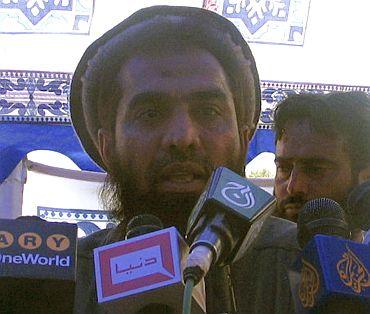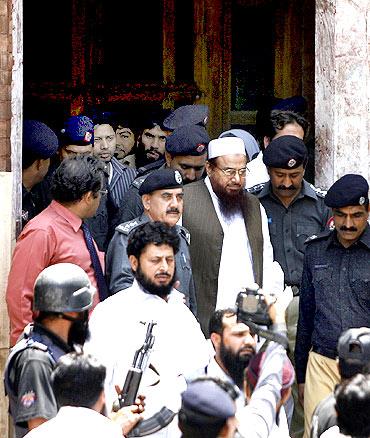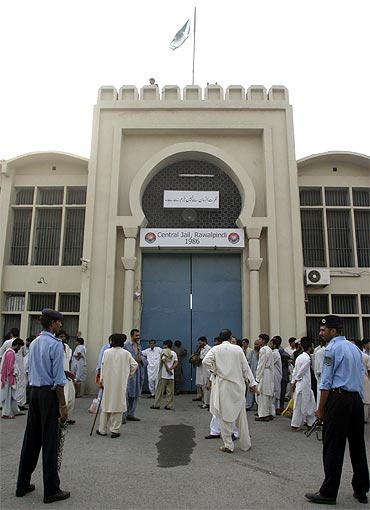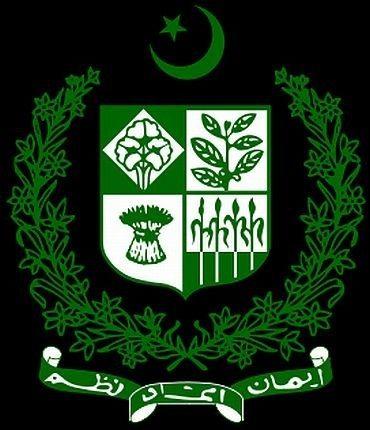A united LeT will continue its efforts to destabilise India and personally step in to worsen matters with major terror operations like 26/11, claims Vicky Nanjappa
Nearly three years ago, Lashkar-e-Tayiba proved just how dangerous it was by carrying out a perfectly coordinated, lethal attacks in Mumbai on November 26, 2008, that claimed 166 lives.
According to the latest dossier on the LeT, though the outfit and its members have maintained a low profile, nothing much has changed within the organisation.
Top leaders of the group, including Zaki-ur-Rehman Lakhvi, are behind bars. But they continue to be operational.
These terrorists are perceived as 'freedom fighters' in certain sections of Pakistan and the Inter Services Intelligence continues to patronise them despite international pressure.
Lashkar: Still dangerous, deadly and destructive
Image: LeT founder Hafiz SaeedSecurity analysts believe that the Lashkar is trying to expand its reach across the globe, but its primary target is still India. The dossier points out that though the LeT has the capacity to stage an attack anywhere, it has been instructed to desist from doing so.
The LeT is also grappling with growing factionalism within the outfit.
Stephen Tankel, author of Storming the World Stage -- The Story of the Lashkar-e-Tayiba, pointed out in an interview with rediff.com that the growing factionalism within the Lashkar could be dangerous as it may spin out of control.
Indian intelligence agencies believe that it is becoming difficult for the ISI to control Lashkar operatives. Emotions are running high within the LeT as a reaction to the offensive in Afghanistan and the killing of Osama bin Laden.
Lashkar: Still dangerous, deadly and destructive
Image: The Rawalpindi Jail where the 26/11 accused are lodgedLashkar operatives are getting restless and they want to help their 'brothers' in Afghanistan, according to the dossier. The ISI is worried that if such LeT operatives are allowed to function on their own, then it would spell doom for the outfit eventually.
Earlier, when Lakhvi was arrested in Pakistan, he was told to maintain a low-profile.
The mastermind of 26/11 strike -- Hafiz Saeed -- continues to be an inspirational figure for the Lashkar cadres. But the LeT operatives are more attached to Lakhvi, who is known as chacha.
Worried by the growing factionalism, the ISI tried to make a change in the LeT's top leadership eight months after 26/11, but the cadres were not ready for that.
The Pakistani spy agency then decided to allow Lakhvi to operate the LeT from behind bars.
Lashkar: Still dangerous, deadly and destructive
According to a western intelligence report, Lakhvi continued to call the shots in the LeT from his prison cell, and this has mended the fractures within the outfit to some extent.
While Hafiz Saeed is a good speaker who can motivate the crowd, Lakshvi can lead from the front and connect better with cadres while carrying out a terror operation.
According to the Intelligence Bureau, the top leadership of the Lashkar has remained unchanged and there are no immediate problems for the outfit.
A united LeT will continue its efforts to destabilise India and personally step in to worsen matters with major terror operations like 26/11.
Lashkar is also trying to encourage home grown terror in India by forming and actively backing outfits like the Indian Mujahideen.
Indian agencies were so busy tracking the IM that they unwittingly lowered their guard against external threats like LeT, making it easier for the outfit to carry out a vicious attack like 26/11.





article